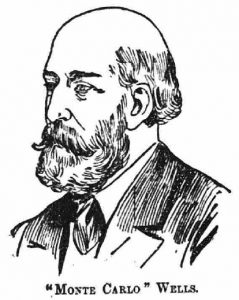Having won the equivalent of hundreds of thousands of pounds on the previous day, Charles Deville Wells was now ready for a repeat performance. Although news of his exploits had not yet reached the British press, the ‘News in Brief’ columns of the Derby Daily Telegraph nevertheless carried some fascinating stories from around the world.
Fortune has smiled on the explorers in the field of electrical science, says an American paper. No scientific body in the United States has so many millionaires as the American Institute of Electrical Engineers.
[In his role as an inventor, Charles Wells had patented various electrical devices, including ‘electric baths’, and an ‘improved arc lamp’].
Sarah Bernhardt
Recently there had been persistent rumours that Sarah Bernhardt, the world’s most famous actress, had lost all of her money at the tables in Monte Carlo, and had attempted suicide. The Casino appears to have been successful in keeping this adverse publicity out of the newspapers. Having recovered from the alleged incident, Sarah Bernhardt had just begun a tour of Australia.
Madame Bernhardt is busily adding to her menagerie in Australia. She has already acquired a couple of splendid colonial dogs, a magnificent cockatoo, two laughing jack-asses, and a young kangaroo, which has become a special pet.
In today’s world we are very conscious of the effects of human activity on the ecology of the planet. Things were rather different in 1891:
The whaler Polar Star, which reached Dundee on Monday from Greenland, brought 70 tons of oil and three tons of whalebone, the value the latter at present being £2,300 per ton. She also has 426 seals, 20 bears, and one narwhal.
Victorian doctors now believed they knew the cause of baldness (a topic doubtless close to Charles Wells’ heart!):

Charles Deville Wells, the man who broke the bank at Monte Carlo
The increasing prevalence of premature baldness is a fact now recognised by the medical profession. According to Dr. Joseph Tyson’s remarks in the Lancet, the principal cause, although not the sole one, seems to be the frequent covering of the head. Women notoriously lose their hair less often. The cause is found in the comparative lightness of their head gear.
